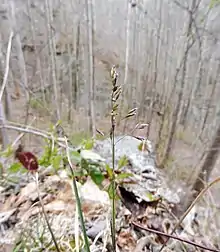Poa cuspidata
Poa cuspidata, commonly called early bluegrass,[1] is a species of flowering plant in the grass family (Poaceae). It is native to the eastern United States, where its range extends from Appalachian regions into the Coastal Plain, where it is less common.[2][3] In the Appalachian mountains, it is a common species found in forest openings.[4]
| Poa cuspidata | |
|---|---|
 | |
| Scientific classification | |
| Kingdom: | Plantae |
| Clade: | Tracheophytes |
| Clade: | Angiosperms |
| Clade: | Monocots |
| Clade: | Commelinids |
| Order: | Poales |
| Family: | Poaceae |
| Subfamily: | Pooideae |
| Genus: | Poa |
| Section: | Poa sect. Madropoa |
| Species: | P. cuspidata |
| Binomial name | |
| Poa cuspidata | |
Poa cuspidata derives its common name from its early flowering period, which begins in March with the very first spring wildflowers. Within its range, other Poa generally bloom later in the spring season.
Description
Poa cuspidata is a rhizomatous perennial.[4] Its culms are loosely tufted and range from 3–6 dm (12–24 in) in height. Its leaf blades are 2–4 mm (0.079–0.157 in) wide and its leaf sheaths are pubescent, especially at their base. The plant has a loose and nodding panicle, with branches that bear three or four flowered spikelets.[5]
References
- USDA, NRCS (n.d.). "Poa cuspidata". The PLANTS Database (plants.usda.gov). Greensboro, North Carolina: National Plant Data Team. Retrieved 11 July 2018.
- "Poa cuspidata". County-level distribution map from the North American Plant Atlas (NAPA). Biota of North America Program (BONAP). 2014. Retrieved 11 July 2018.
- Alan Weakley (2015). "Flora of the Southern and Mid-Atlantic States".
- "Poa". Grass Manual on the Web. Archived from the original on April 15, 2017.
- Anna Anisko (2007). "illustrator". The Plants of Pennsylvania: An Illustrated Manual. By Ann Fowler Rhoads, Timothy A. Block (illustrated ed.). University of Pennsylvania Press. p. 338. ISBN 9780812240030.